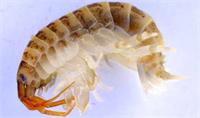The news that the Demon shrimp (Dikerogammarus haemobaphus) has been discovered in the River Severn and is almost certain to spread to other river systems could be devastating for anglers and extremely damaging for our fisheries.
The Angling Trust is demanding that the government immediately announce the ratification of the International Maritime Organisation’s International Convention for the Control and Management of Ships’ Ballast Water and Sediments. Ballast water transfer has been identified as a major pathway for invasive species to spread across the globe, threatening ecosystems as they are moved. This Convention has been ratified by countries as far away as Antigua but not by the UK. The Trust has today written to the Parliamentary Under-Secretary for Transport, Stephen Hammond MP, pointing out that further delay would be ‘negligent’.
 The Demon Shrimp, like the Killer Shrimp which found its way into a number of still waters last year, is a non-native species and is predatory on other insect life. It could therefore dramatically affect the availability of the main food source for most species of fish and many birds, with unknown but potentially disastrous consequences.
The Demon Shrimp, like the Killer Shrimp which found its way into a number of still waters last year, is a non-native species and is predatory on other insect life. It could therefore dramatically affect the availability of the main food source for most species of fish and many birds, with unknown but potentially disastrous consequences.
Angling Trust chief executive Mark Lloyd said:
“This news is similar to the recent discovery of a killer fungus that could decimate ash trees in our woodlands. Put alongside the existing problems of signal crayfish and the recently arrived Killer Shrimp, it is vital that the government takes all appropriate steps to reduce threats from invasive non native species to our environment.
“As an island we have an advantage over other countries and we should make the most of that by cutting off the known routes by which these species can invade. An obvious one would be immediately to ratify commonsense and long overdue measures to prevent their transfer through ships’ ballast. We call on DEFRA to work up an integrated strategy to tighten up on controls on imports, and to increase public awareness and education about bio-security measures needed to stop these species from spreading further in the UK.”








